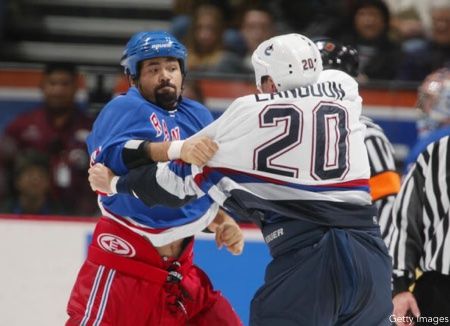My parents used to take my little brother and me to Madison Square Garden early for Rangers warm-ups when we were kids. I'd hover around the glass, looking as cute as I could in my Statue of Liberty alternate jersey. After all, I could get a puck from Sandy McCarthy.
McCarthy was the Rangers' chief enforcer for three-plus seasons starting in 2000. He was 6-3 and 225 pounds with a crisp goatee. By NHL standards, he was a poor skater with average hands.
But, man, could he fight.
At the end of warm-ups, the Rangers would send McCarthy around with a bucket of pucks to toss into the crowd. "Nick Fotiu used to do the same thing," my mother would tell me. Fotiu was a Staten Island-bred bad boy, still famous in New York for throwing warm-up pucks as far into the crowd as he could reach.
The Rangers were bad in McCarthy's days. He never made the playoffs in New York. But he did win a spot in Rangers fans' hearts forever.
Much like the spot John Scott has earned with hockey fans.
Fast-forward to this past Nov. 5. I am sitting with Tie Domi, the NHL's all-time leader in fights (338) at the Four Seasons New York to interview him about his book, Shift Work. Growing up, I hated Domi. I was too young to see him as a Ranger, but I caught his antagonism as a Maple Leaf.
"Tell him he's a punk," my dad advised me a few hours before the interview.
Instead, I shared my McCarthy warm-ups story with Domi. I half-expected him to sock me. Domi and McCarthy fought seven times, but there was no fire in Domi's eyes hearing McCarthy's name.
"That makes me proud," he smiled. "That's why every guy I fought I put in my book because they're all about the team. I want to make a positive for all those guys because those guys did what I did and it's not easy to do."
I asked Domi about the dwindling role of the enforcer, a question Domi, and McCarthy, wherever he is in Canada, probably get all the time. Domi brought up a name even non-NHL fans have gotten to know recently.
"John Scott and Steve Downie being in Arizona with Max, for me, that's a good feeling," Domi said, referring to his son, a rookie with the Coyotes. "I don't really see many teams having guys anymore, and you do have to protect scorers. My son, in junior hockey the last four years, and I watched him in the World Junior Championship (in 2015), they try to kill him. As a father, who tried to protect guys like my son, it was tough to watch."
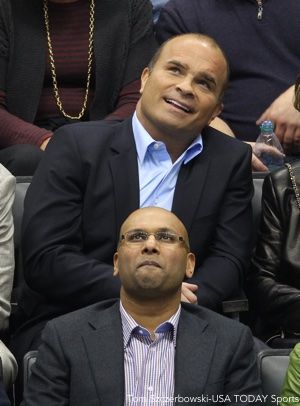
Max Domi's skill set bears little resemblance to his father. Tie tallied 245 career points (and 3,515 penalty minutes, third all time) in 18 seasons. Max has 31 points in 45 career games. But the two have complementary styles of play. One is the performer, and one is the protector.
John Scott has 11 points in 285 career games. He also has 542 penalty minutes and 48 fights. One thing Scott has that neither member of the Domi family has: An All-Star Game selection.
Scott initially urged fans to vote for a more deserving player than him. As his votes gained momentum, Scott leaned into the spotlight.
The NHL and the Coyotes threw haymakers trying to convince Scott to avoid the All-Star Game, but instead, he announced his intention to play. He won the spot as Pacific Division captain, and the NHL was forced to blast his victory on social media. Then, last week, Scott was shipped off to the Canadiens. He left his nine-months pregnant wife to join the St. John's Icecaps, Montreal's AHL affiliate.
Scott's All-Star Game endeavors appeared lost -- he was even offered tickets to the game for him and his family without playing in the game. This sent NHL fans into chaos, and on Thursday, the league turned around and announced it will allow Scott to captain the Pacific All-Stars even though he is no longer under contract in the division.
Scott is by no means the NHL's most popular enforcer, and the Coyotes have the second-worst attendance in the league. As noted by Vice Sports' Sean McIndoe (formerly of Grantland), Scott's campaign was not the result of a cult fan base. McIndoe refers to the Scott vote as "mean-spirited." The seeds of the campaign were planted by fans (and journalists) trying to find the "worst player they could think of" to see "how funny it would be to watch him try to keep up with real players."
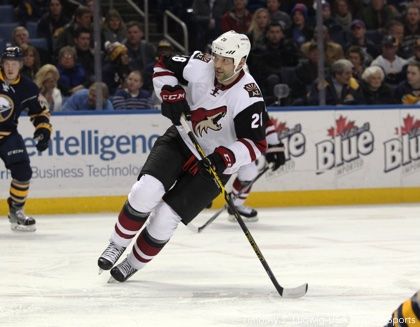
McIndoe is right. That is how the John Scott campaign started. But it is not why it succeeded.
The entire John Scott saga is NHL fans' cry for help. It is part of the tug of war between the NHL and its fans that has been lasting for more than a decade.
The role of an NHL enforcer is hard to understand. Objectively, I am having trouble justifying it for this piece. How can I argue that players with limited talent deserve roster spots (on NHL teams, let alone All-Star teams) to skate full speed at opponents for excessive checks and sometimes, literally fistfight for a modest five-minute penalty?
Domi can explain. "I don't want to talk about having the most fights in NHL history," he told Simon & Schuster when starting his book. "That was my job. That was to protect my teammates. That's what I did."
Chatting with Domi taught me about the lifestyle of an NHL enforcer. His book's prologue recounts a lesson taught to him by Mark Messier on respecting opponents. Mario Lemieux, Floyd Mayweather and Alex Rodriguez, three mega-athletes who have become friends with Domi since his retirement, all attended his book launch. As a rival fan, I saw Domi as a nuisance to my team. Don't judge me when I say I would half-root from McCarthy to cheap shot him with an elbow or cross-check from behind.
Hockey fans love their enforcers. These are the players who make their money with a team-first attitude. As is the case with Domi, this is the mindset off the ice, as well. Lemieux calls Domi "the best teammate I never had." I saw that first-hand at his book launch.
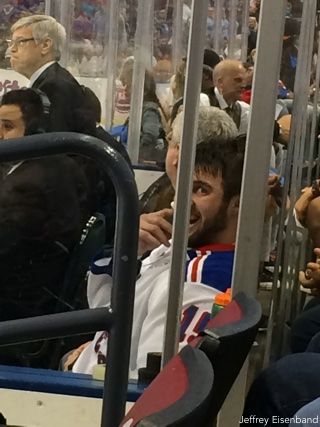
On Jan. 2, my family and I got tickets for the Rangers-Panthers game in Florida a few paces away from the visiting penalty box. Tanner Glass, who leads the mostly disciplined Rangers with three fights this season, tussled with seasoned fighting vet Shawn Thornton 2:46 into the game. Glass entered the penalty box with an ear-to-ear grin. A mosh of New York transplants in South Florida hovered around the sin bin, my family included. Glass, in no rush to get back on the ice, posed for any fan that yelled his name, with camera and Snapchat ready.
Glass did his job. He sent a message to the Panthers that the Rangers would play tough, and he was glad to see fans respect his role.
I did not vote for John Scott because I am lazy and did not take the 30 seconds to vote. I was rooting for John Scott in this All-Star vote, not because I think the whole thing is funny, but because I think it is exciting. John Scott is not my hometown enforcer, but he represents a portion of the game I respect.
Even writing this, I am having trouble defending organized fighting being a part of an American sport. Baseball and basketball players get suspended for throwing punches. Hockey players get a timeout. Sandy McCarthy, Tie Domi, Tanner Glass and hundreds of other players have not convinced me to save the enforcer. But they have convinced me to understand their plight.
The hockey community cannot ignore the decline of enforcers. Last season, the NHL had 426 fights in 1,230 games. That average of 0.35 fights per game was the lowest percentage since 0.33 in 1968-69.
CBS Sports' Adam Gretz sums up the current standing of NHL tough guys:
The role of the NHL enforcer is pretty much extinct outside of a small handful of players that are still floating around the league, and even they are seeing their roles reduced or completely done away with.
As general managers and coaches put more of an emphasis on skill and actual hockey ability throughout their lineup that role is only going to further decrease.
Teams are simply too evenly matched and points are too important, even in October and November, to use up roster spots on players that serve no purpose other than to drop the gloves for the occasional fight. Especially when so few teams around the league employ another player just like them that gives them a potential partner.
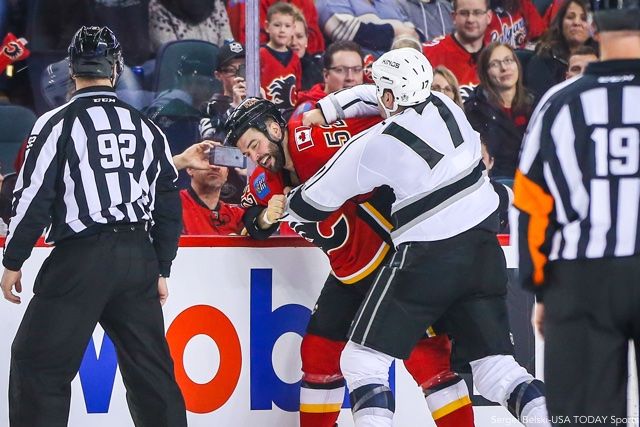
At first, I was uneasy about Scott taking away a potential All-Star role from a skill player. Now, I realize it is now or never for fans of the enforcer. Pushing Scott through to the All-Star Game is a collective cry for help to maintain the bruising excitement of enforcers.
A bunch of reddit users did not get Scott to the All-Star Game. A continent of hockey fans who understand the job Scott is expected to perform every night voted him in.
The irony here is that if John Scott were to be taken off the All-Star Game roster, the Coyotes would get an alternate player -- most likely a forward. Max Domi is second on the team in goals and third in points, and he would probably be that pick. If there is any player who understands Scott's All-Star qualities, it is the son of Tie Domi. If Scott is taking Max's spot, so be it.
It is the NHL that does not understand. But thanks to fan support for Scott, the league (and 30 NHL teams) learned a lesson this season.
The enforcer may be dying, but its fans will not go down without a fight.
-- Follow Jeffrey Eisenband on Twitter @JeffEisenband.


